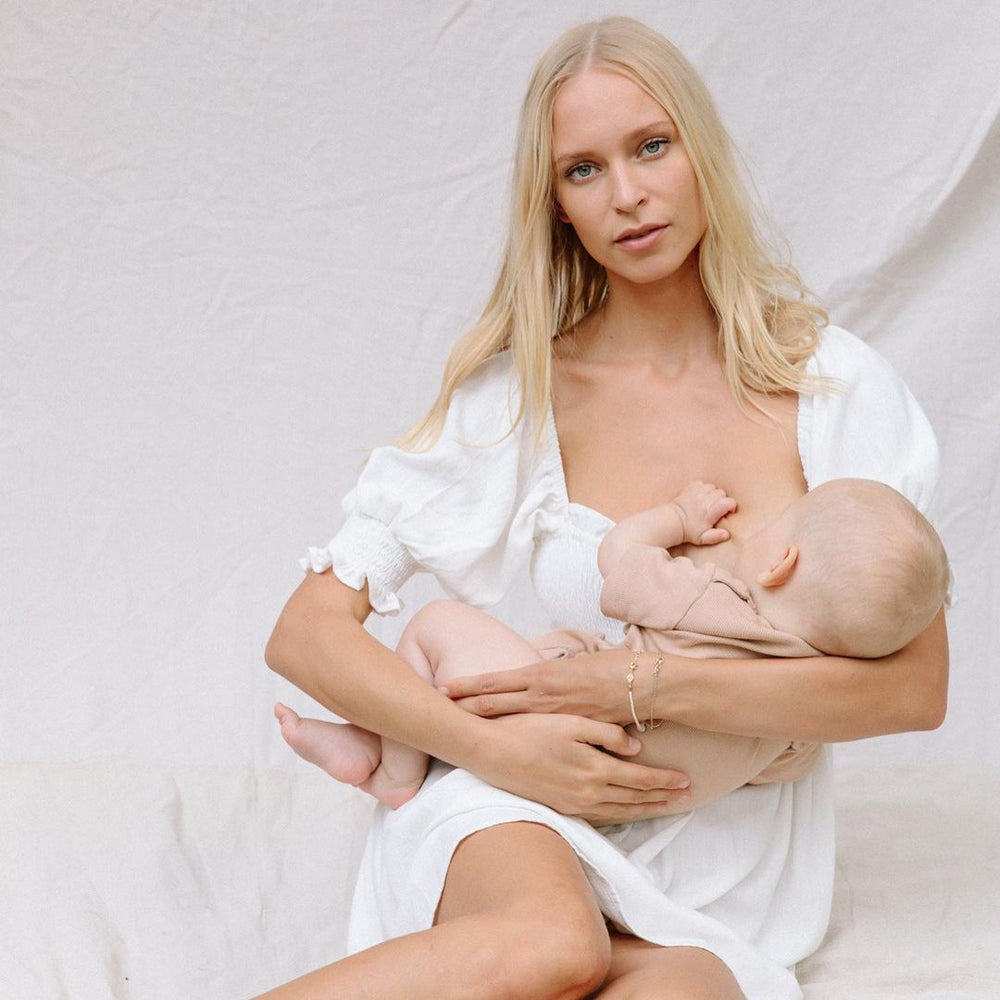After dutifully catering your diet to your growing baby throughout nine months of pregnancy, baby’s arrival offers many mothers a sense of freedom. There’s sushi! There’s cocktails! There’s deli meat! The world may seem like your gastronomical oyster—and it is, mama—but if you choose to breastfeed there are some foods experts recommend limiting.
Read on for the top four foods to avoid while nursing.

1. Fish High in Mercury
“Fish high in Mercury should continue to be limited for the duration of breastfeeding,” says Stephanie Lauri, Registered Dietitian Nutritionist and Certified Lactation Educator. “Fish with the highest mercury levels include shark, swordfish, king mackerel, tilefish, bigeye tuna, marlin, and orange roughy.” Wondering why? “Most mercury exposure occurs during pregnancy via the placenta, however mercury does pass into breast milk in smaller amounts and can affect infant brain and nervous system development,” Lauri explains.
2. Caffeinated Beverages
“Caffeinated beverages should also be consumed in moderation (under 300mg per day), as caffeine transfers in small amounts through breastmilk,” Lauri says. Of course coffee comes to mind, but also consider, “caffeine is found in your coffee, tea, sodas, energy drinks, and chocolate.” We know, telling a new mom to limit caffeine is like asking a fish not to swim, but keep in mind, “irritability, poor sleep, fussiness, and jitteriness have been reported in infants of mothers with very high intake of caffeine.”
3. Nutritionally-Void Foods
You know the saying, “everything in moderation?” That may include nutritionally-lacking foods sometimes. We get it. There’s no judgment in the new mom game, but keep in mind that baby is still depending on you for their nutritional needs. Lauri elaborates: “Just because you are no longer pregnant, you are still growing your baby, just on the outside. Many nutrient requirements are actually increased during lactation, compared to pregnancy. Mom's nutrient status of many vitamins will impact the levels found in breastmilk,” Lauri explains. Those include, “B-vitamins, folate, choline, vitamin C, Vitamin D, Iodine, Selenium, and Zinc.”1
“When you're exhausted and busy feeding a newborn around the clock it can be easy to push your own nutrition and self care far down on your priority list. If you had a well balanced diet during pregnancy with an emphasis on nutritious (plus some fun) foods, nothing really needs to change in your mentality of a ‘breastfeeding diet.’ Continue your pregnancy nutrition and hydration habits to continue to nurture the growth and development within your now earth side, love,” Lauri says.
Worried about getting all the postpartum nutrients you need? We formulated the Mom Multi Support Pack specifically with postnatal support in mind.
$49.95
$32.95
$44.95
Shop the Article:

Mom Multi Support Pack
/ Month
Shop Now

Sleep Support*
/ Month
Shop Now

Synbiotic Greens Powder
/ Month
Shop Now
4. Alcohol
Craving a margarita? Glass of wine? There’s no reason to abstain entirely from alcohol as you breastfeed, but keep in mind that alcohol can pass through your breastmilk. General guidance? If you’re fine to drive, you’re fine to breastfeed.
Keep in mind that studies have shown short-term exposure to small amounts of alcohol in breast milk produces may negatively affect baby’s sleep.2
Should you avoid common food allergens?
Lauri suggests, “food allergens do not require avoidance while breastfeeding, unless the mom has an allergy to a food herself. According to the AAP, there is insufficient evidence to determine the influence of breastfeeding on food allergies. However, if your child is at high risk for food allergies, discuss with your own pediatrician and health care team for individual evaluation and direction of food avoidance while breastfeeding.”
How can you tell if your baby is having a reaction to something you ate?
“Breastmilk typically does not cause allergic reactions in babies. Signs of allergic reaction (most commonly due to cow's milk protein) are eczema or hives, severe diarrhea or bloody stool and your pediatrician should be contacted right away.”
“Food sensitivities, different from food allergies, may cause less severe symptoms like fussiness, crying, or gas, and typically last less than 24 hours. If your baby reacts every time after you eat a certain food, you can temporarily avoid that particular food. However it is likely unnecessary to go on a complete elimination diet,” Lauri says.
How is your breastfeeding journey going? We asked five women to share their feeding diary and tell us how it's going really. Plus, get more expert-backed content like this by joining the Perelel community on social.
By Jessica Lopez. Jessica Lopez is a freelance writer, digital content creator, and new mother. She has covered all lifestyle topics ranging from bridal to beauty for publications including Brides Magazine, Byrdie, THE/THIRTY, and more. Walking wide-eyed into motherhood has inspired her to connect with other parents through her writing and shared experience. You can follow more of her journey @Jessica.H.Lopez.
This article is for informational purposes only. It is not, nor is it intended to be, a substitute for professional medical advice, diagnosis, or treatment and we recommend that you always consult with your healthcare provider. To the extent that this article features the advice of physicians or medical practitioners, the views expressed are the views of the cited expert and do not necessarily represent the views of Perelel.
1 (Med Clin North Am. 2016 November ; 100(6): 1199–1215)
2 J A Mennella, C J Gerrish. Effects of exposure to alcohol in mother's milk on infant sleep. May 1998




















